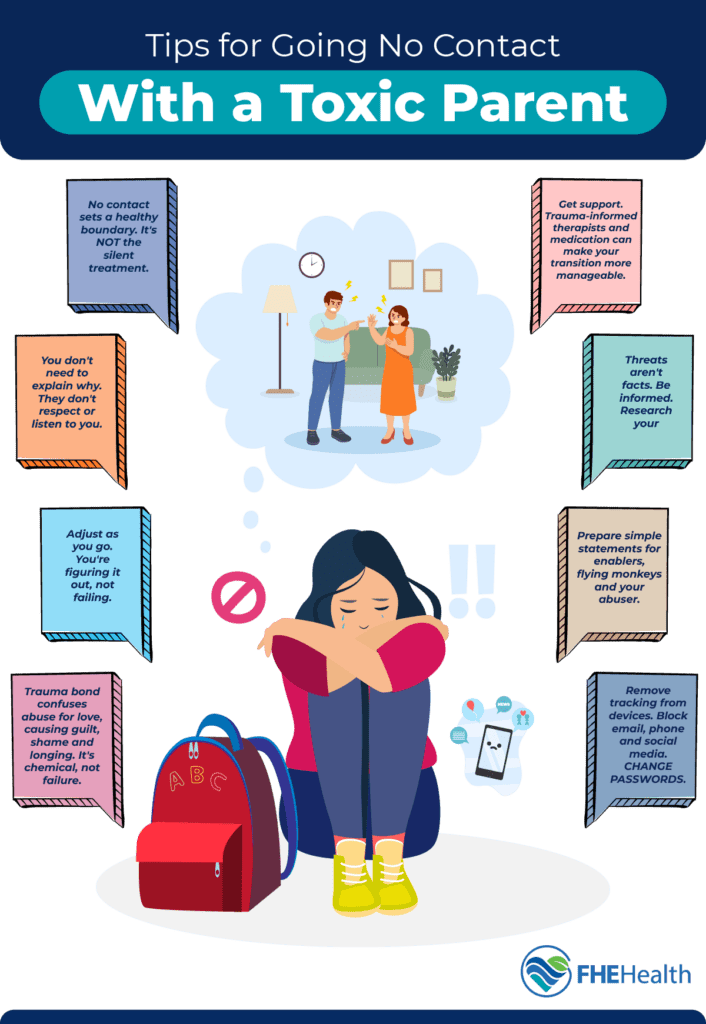
Updated June 21, 2024
Sometimes going “no contact” with a loved one is necessary for the sake of a person’s mental health, yet discerning when and how to do that can be difficult. For some people, cutting off ties with a close friend or family member seems extreme, even though circumstances may call for it. For others, the challenge has more to do with the “how” of setting that boundary and maintaining it.
For advice on such questions, we reached out to someone with expertise in this area. Dr. Beau A. Nelson, DBH, LCSW is Chief Clinical Officer at FHE Health. In a recent interview, he shared his answers to questions like:
- Why would someone want to go no contact?
- Are there signs to look for that signal it’s time to go no contact?
- What factors are important to consider before going no contact?
For answers to these and other questions, read on.
Defining “No Contact”: What It Is and Is Not
We began the interview by asking Dr. Nelson to define “no contact.” Here is how he described it:
Going no contact is setting a healthy boundary and excluding someone from your life. It is taking charge of the relationships in one’s life and eliminating those that are harmful or toxic. This is not something that the other person agrees to, it is a decision that someone makes to take care of themselves.
What No Contact Is Not
Dr. Nelson shared what no contact is not: “No contact is not the same as punishing the other person, via the silent treatment or stonewalling and refusing to communicate in the effort to change their behavior. This is not about the other person; it is about the one making the healthy boundary.”
Why Someone Would Want to Go No Contact: Signs to Look for
What are some reasons someone would go no-contact in a relationship, and are there signs to look for that may signal it’s time to go no contact? Going no contact can be seen as an extreme move, especially in certain cultures and religions, but in some situations it is necessary. Dr. Nelson mentioned some examples:
- Abuse or neglect
- Toxic dysfunction, perhaps from mental health issues or substance use disorder not addressed
- Criminal or unsafe behavior that puts you at risk
- Narcissism or control issues
- Violation of boundaries that does not change once addressed
- Betrayal or ignoring your needs in relationship
- Overbearing and undermining behavior, bullying, criticizing, belittling, or ridiculing behaviors and other forms of abuse
- Emotional manipulation such as gaslighting or playing mind games in an effort to control you
Important Considerations Before Going No Contact
We asked Dr. Nelson for suggestions about what to consider before going no contact:
Recognize that there is usually a range of emotions in making a step like this, sometimes people are sad, even when leaving an abusive person, or acknowledging that your family ties are broken, and the sense of loss of that. Maintaining healthy boundaries is not all good or bad, it comes with a variety of feelings, and you will want to have support to fill in those voids and help to navigate the process of change.
Some other considerations and questions to ask yourself before going no contact, according to Dr. Nelson:
- Is this relationship toxic, abusive, or dangerous?
- Does this person lack the capacity or willingness to change or negotiate a better relationship?
- Have I tried to set a boundary before that failed?
- Do the benefits of going no contact outweigh the costs of staying in contact?
Suggestions for How to Go No Contact
Did Dr. Nelson have any advice for those wondering about how to go no contact? Yes:
Think through the process, how to state your intention, how to maintain it, what to do when the other person challenges you, who will be your supports, and how to be aware of what are the warning signs you are slipping back into a bad relationship. This is easier with a trusted support, counselor, mentor, or friend who can offer ideas, support, and awareness when needed.
The Impact of Going No Contact
Going no contact will have an impact on the two parties involved, both you and the other person, Dr. Nelson said:
As stated above, you will go through many different feelings. Being present with yourself, having a support system in place, and being healthy in your choices will be key to helping you getting through a change like this. The adage that time heals all wounds is generally true in a no contact decision; there will be a different perspective once the drama and the gaslighting are gone. Taking a break, focusing on your health and wellbeing, and making positive choices in your life, changes perspectives. You will be able to evaluate your life and relationships better once the strain is lessened.
Your healthy choices for yourself are not necessarily celebrated by all. There may be fallout or pressure from others to change your mind. You have one life to live, so you make the best choices you can. If needed you can adjust but commit to a long enough time to get clarity on what you should do, not what others want you to do.
Many people ask how this is going to affect the other person. My thought is to generally dissuade this line of thinking entirely. You got stuck because you looked at others’ emotions and sometimes valued them over your own wellbeing. However the other person feels, is theirs. We cannot see into their souls; we cannot predict what they are feeling. In making this move to separate, make the conscious choice to separate completely—in your life and from your head (stop thinking and ruminating on them!).
Final Encouragement and Parting Advice
Making changes, even when they are healthy, can be hard. “It can be extremely liberating and empowering to be making a choice to choose yourself and prioritize your mental, emotional, and physical wellbeing,” Dr. Nelson shared. He named some of the potential benefits of going no contact, including:
- increased feelings of self-worth
- less anxiety and pressure
- the ability to focus on what is important to you
- the opportunity for new healthier relationships
- freedom from abuse
- improved self-care
- breaking the trauma cycle
- showing others in your life healthy choices
FHE Health Can Help
Are you interested in going no contact but feel you need some emotional support first? The trained, compassionate counselors at FHE Health can be your anchor during this difficult time. Contact us to book an appointment today.







